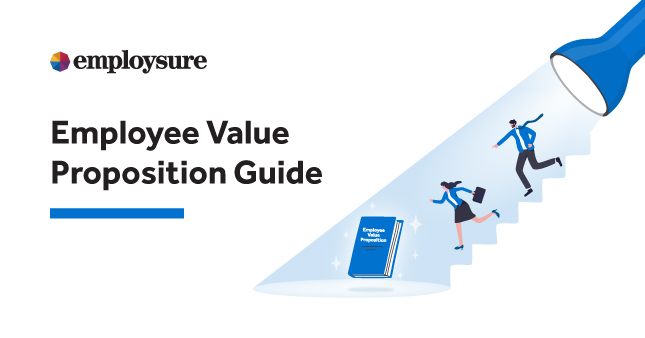
What is an employee value proposition (EVP)?
Businesses use their employee value proposition (EVP) to attract and retain top-level talent. An enticing EVP will breakdown the unique mix of benefits a business offers its employees in exchange for their skills, dedication, and hard work. It will highlight tangible and intangible benefits, from pay and other rewards, to the amazing company culture and inspiring development opportunities.
The so-called “war for talent” means having a compelling employee value proposition is vital for hiring the best staff. Against a competitive backdrop where candidates are looking beyond salary, a well-rounded EVP can help your business stand out from the crowd.
Creating a compelling EVP is all about understanding your company’s essence and highlighting what sets it apart from other businesses. It should generate excitement about working for your company, while adding depth and character to your brand, forming an important part of your employer relations strategy.
What’s the difference between an EVP and employer brand?
The two often overlap but they’re not the same thing. It helps to imagine your employee value proposition as inside knowledge about what it’s like to be a part of your organisation.
Your EVP is the unique set of benefits and opportunities that you offer your employees in return for their commitment to the business. It’s what makes your company a great place to work, and it’s what helps you to recruit industry-leading talent.
Your employer brand, on the other hand, is the public face of your EVP. It’s the reputation that you have as an employer, and it’s what potential employees think of when they hear your company name.
In this way, your EVP is the substance, and your employer brand is the style. Your EVP is what you offer, and your employer brand is how you communicate it.
If your employer brand is dull and uninspiring, people are less likely to be interested in your EVP, no matter how much time and effort you spend developing it.
Employee value proposition framework
If you’re wondering what to include in your EVP, here are five essential elements that should be front and centre:
Compensation: This covers the complete renumeration package, including base salary, bonuses, commission, overtime pay, and any other financial benefits.
Benefits: Employees are also keen to learn about the other benefits on offer, which might include health insurance, superannuation, paid leave, or a gym membership.
Career development: This is one of the main motivations for joining and staying with a company. Employees want to see the long-term potential to grow in their role and advance into other positions.
Environment: A dreary office setting is unlikely to inspire staff, while a clean, comfortable and spacious workspace gives employees a positive environment to perform in. In the remote work era, your environment might extend to people’s homes.
Culture: A thriving workplace culture is built around meaningful work, open communication, and close collaboration. Having the right culture gives staff a shared identity to take pride in.
Benefits of an employee value proposition
By this stage, you might be wondering what the benefits of an EVP are for your business. Here are some of the biggest:
✔ Attract and retain high performers: An EVP explains why the most talented candidates should want to work with your company. It also gives existing staff “reasons to stay”.
✔ Cost savings: LinkedIn reports that a strong EVP attracts the best staff, reduces turnover, lowers the need for high salaries, and significantly increases productivity. In total, a moderately sized business can make net annual savings of $13 million.
✔ More engaged workers: An EVP can ensure higher staff engagement throughout the entire employee lifecycle. Before an employee can connect with you, they need to know who the company is and what it stands for. An EVP makes your business’s identity and purpose crystal clear.
✔ Improved transparency: Your EVP can help a prospective employee get to know your business before they start work. This means it’s important to create an honest and realistic picture of your company – don’t make promises you can’t keep! Your employee contracts should include the perks proposed by your EVP.
What to include in your EVP
Before you start listing off all the amazing things your company has to offer, take a step back and ask your current employees why they think working there is so great. It’s a perfect time to send out anonymous surveys and gather some valuable feedback.
Who knows, you might already be doing some awesome things that your employees appreciate, and job candidates will love too. Is it your commitment to employee development? Your dedication to work-life balance? Or maybe it’s your out-of-this-world company culture? Whatever it is, find out what makes your company tick and use it to your advantage.
Company culture
It’s vital that your EVP gives candidates a sense of what a day in their job will look like. Not just in terms of what work the company is involved in, but also what the workplace culture is like.
Workplace culture is like the invisible glue that holds a company together. It’s the vibe, the energy, the feeling you get when you walk through the door, and it’s something that candidates are paying close attention to these days.
If you’ve got a great company culture, flaunt it! You could tell candidates about the staff events and activities they can get involved in, or share stories about employee incentive schemes, rewards, and competitions. Your aim is to make sure your EVP clearly conveys the unique atmosphere that makes your company special.
If possible, try to include quotes from existing employees. Your people are the bedrock of your culture, and nothing beats hearing a glowing review straight from the horse’s mouth!
Compensation
It’s time to discuss the big kahuna – salary. Unsurprisingly, the pay you offer will be a major factor when it comes to finding new employees, but don’t just start throwing around big numbers in an attempt to lure in talent. This approach can quickly eat into your recruitment budget. Also remember that it’s against the law to include pay secrecy clauses in new contracts, which means you might find that all your staff suddenly have higher salary demands!
Instead, you should focus on creating a well-rounded compensation package that includes a competitive salary. Once you’ve made a new hire, it’s important to monitor their development and productivity, measuring it against their salary on an ongoing basis. By losing track, you run the risk of undervaluing your team. This will essentially lead them to feel unappreciated and might encourage them to look elsewhere.
As a rule of thumb, you should review employee salaries against key performance indicators (KPIs) and industry benchmarks on an annual basis. This helps to ensure that all your staff are earning what they deserve.
Rewards and recognition
Recent studies by Seek show that candidates don’t just look at salary, but also at rewards, recognition, employment benefits and the perks a job has to offer.
In other words, top candidates are looking at the entire compensation package rather than just the monetary amount. In a nutshell, rewards and recognition are like the icing on the cake of a stellar EVP.
Here are a few different forms of rewards and recognition that you can include in your EVP:
Financial rewards: Monetary rewards are always a hit with employees. They can include bonuses, commissions, and profit-sharing programs.
Non-financial rewards: Non-financial rewards can be just as motivating as financial rewards. They can include things like extra leave days, flexible work arrangements, and company-sponsored events.
Public recognition: Public recognition is a great way to show employees that their hard work is appreciated. It can include things like employee spotlights, awards programs, and shout-outs at company meetings.
Peer recognition: Peer recognition is another powerful form of recognition. It can be as simple as a colleague saying thank you or giving a shout-out on social media.
No matter what type of rewards and recognition you choose, make sure that they are aligned with your company culture and values. And be sure to communicate your rewards and recognition program to employees clearly and effectively.
Development opportunities
Development opportunities are like the sprinkles on top of a sundae. They make your EVP even more irresistible and appealing to top talent.
Why? Because employees want to know that they will have the opportunity to grow and learn at work. They want to feel challenged and inspired. And, most importantly, they want to know that a prospective employer is invested in their success.
It’s rare for somebody to apply for a role that they intend to stay in for the rest of their career. Instead, people tend to apply for roles with employers that offer strong long-term prospects for career development, promotions and climbing the company ladder into more senior positions.
That’s where development opportunities come in. By offering employees the chance to learn new skills, develop their careers, and take on new challenges, you’re showing them that you’re committed to their growth and development.
Environment
A dreary office setting is unlikely to inspire staff, while a clean, spacious well-designed workspace gives employees a comfortable and positive environment to perform in. In the remote work era, your environment might extend to employees’ homes.
You should also remember that a great work environment is more than just a physical space. It’s a culture of collaboration, respect, and support. It’s a place where employees feel valued and appreciated, and it’s a place where people can come to do their best work.

Want to get the best out of your staff?
If you want to maximise the performance of your staff and take productivity to new heights, read our Ultimate Employer Guide to Performance Management.
How to develop an employee value proposition
Ready to create your own EVP? Use this simple seven-step EVP framework:
Step 1: Understand existing perceptions – It’s crucial to understand how your company is perceived by existing employees and externally. Without this knowledge, you’re unlikely to create an authentic EVP.
Step 2: Understand your employee needs – For your EVP to be effective, it needs to be tailored to your employee’s needs. Ideally, it should also target the experience of working in a particular industry.
Step 3: Identify your competitive advantage – What do you offer that other companies don’t? This is your chance to be unique, add character to your brand, and distinguish yourself from other companies.
Step 4: Determine key selling points – Draw up a list of key selling points and be sure to emphasise each one fully. The more you can do to highlight all the benefits of choosing your business, the better.
Step 5: Communicate the message – Everyone in your business should have access to your EVP, ideally receiving a copy internally. Be sure to share it externally on socials and web collateral too.
Step 6: Ensure alignment – Your company should adopt a mindset of actively embodying your EVP. Actions really do speak louder the words, so bring your EVP to life through practical initiatives that encapsulate its ethos.
Step 7: Continually refine – Just as companies evolve and change with time, so do EVPs. You should regularly review your EVP and ensure it accurately reflects the current state of your business.
Employee value proposition examples
Still struggling to find inspiration for your won EVP? Here are 5 examples of EVPs used by some of the world’s biggest and most popular businesses.
Canva: “Create anything with everything.”
Canva’s EVP is all about creativity and empowerment. The company offers a wide range of tools and resources that make it easy for anyone to create beautiful designs, even if they have no design experience. This EVP is likely to appeal to creative people who want to use their skills to make a difference.
Nike: “Just do it.”
Nike’s EVP is all about motivation and inspiration. The company encourages its employees to challenge themselves and achieve their goals. This EVP is likely to appeal to people who are passionate about their work and want to be part of a team that is constantly striving to improve.
Google: “Organize the world’s information and make it universally accessible and useful.”
Google’s EVP is all about making a difference in the world. The company believes that information should be accessible to everyone, and it works to make its products and services available in as many languages and as many countries as possible. This EVP is likely to appeal to people who are motivated by a higher purpose and want to use their skills to make a positive impact on the world.
Patagonia: “Build the best product, cause no unnecessary harm, use business to inspire and implement solutions to the environmental crisis.”
Patagonia’s EVP is all about sustainability and social responsibility. The company is committed to using sustainable materials and practices in its manufacturing processes, and it donates 1% of its sales to environmental causes. This EVP is likely to appeal to people who are passionate about protecting the environment and want to work for a company that shares their values.
Salesforce: “We empower our employees to grow as individuals and as a team. We believe that when our employees are successful, our customers are successful.”
Salesforce’s EVP is all about employee growth and development. The company offers its employees a wide range of training and development opportunities, and it encourages them to take on new challenges and responsibilities. This EVP is likely to appeal to people who are ambitious and want to work for a company that invests in its employees.
Frequently Asked Questions
What are the 5 pillars of an employee value proposition?
Most effective EVPs are built around five core pillars:
- Renumeration
- Benefits package
- Career advancement opportunities
- Environment
- Culture
If you address each of the pillars, you’ll be primed to create an EVP that has talented workers seeking out opportunities with your business.
Employsure helps thousands of businesses maintain happy, healthy and harmonious environments where people can perform their best work. If you need trustworthy workplace relations or health & safety advice, our 24/7 Advice Line is free of cost for all Kiwi business owners. Call 0800 568 012 today to get all your questions answered.










